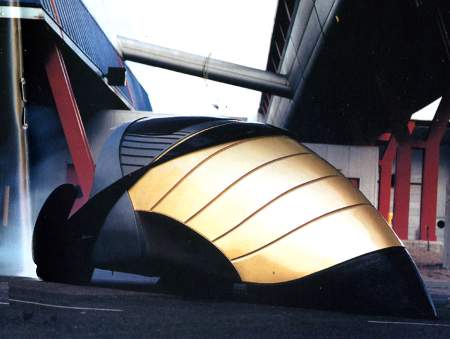B1 - Simple technical English
The Car of the Future ?
Is this "snail car" the
car of the
future ? It does not resemble any of the cars we use today,
and
indeed it is very different.... and totally high-tech. But
you
won't see a car like this on the roads tomorrow. The future is coming,
but not quite so fast.
 Is this "snail car" what tomorrow's car will look
like ?
Is this "snail car" what tomorrow's car will look
like ?This car will use electric energy, not petrol or gasolene; it will have batteries that can be recharged instantly from chargers in the road. It will also be very easy to drive.
In fact, you won't need to drive it; it will drive itself. You will just need to tell the computer: "Go to X" and the car will go there. Also, it will reach X very quickly, much faster than today's cars. It will also be very safe and comfortable.
A lot of the technology already exists, but it is very experimental. Already today scientists are developing new materials for the surface of roads: In fifty years from now, perhaps sooner, some new roads will capture solar energy : they will store this energy under the road, and some cars will be able to use it.
However you probably won't ever drive a "snail car", even if you're under 20 today. This, perhaps, is the car of the year 2100, the car that your grandchildren will maybe drive.
Driving will be nice in the 22nd century ! No pollution, no traffic-jams, no stress.
If, of course, we reach the 22nd century....With all today's problems of global warming, pollution, viruses and natural resources, nothing is certain any more. Scientists have lots of ideas about the car of the future: but the future itself is perhaps less sure.....


are noisy : they make a lot of noise - snail: look at the picture - petrol or gasolene: In Britain people say petrol, in the USA they say gasolene. It is the same. - capture : catch, absorb - traffic jams: when there are so many cars that they all stop.
Return to Linguapress site index
GRAMMAR for
EVERYONE
Kindle e-book or paperback
. From Amazon, Barnes
& Noble, Waterstones and good bookshops
From Amazon, Barnes
& Noble, Waterstones and good bookshops
Listen to this text: ► audio
(mp3)
Kindle e-book or paperback
.
 From Amazon, Barnes
& Noble, Waterstones and good bookshops
From Amazon, Barnes
& Noble, Waterstones and good bookshopsCopyright © Linguapress. Do not copy this document to any other website
Copying permitted for personal study, or by teachers for use with their students
Student Worksheet
The Car of the Future?
Interactive
exercisePut back the twenty missing words in this extract from the article. Some test your vocabulary, others will test your grammar !
Here are the words you will need to use. However take care; this list contains twenty-five words, so there are five words that you will not need to use. You can select a word with your mouse or fingers and slide it into a box.
as already always
can dirty easy
even
ever experimental
faster
from itself like maybe
of say silent
tell
than that there this
to
today's
today's wheels
This car is the opposite of
cars;
cars are noisy
and ,
this one is and clean. Today's cars have
,
this one does not. It moves a snail, but much faster
a
snail !
This car will use electric energy, not petrol or gasolene; it will have batteries that be recharged instantly from chargers in the road. It will also be very drive.
In fact, you won't need to drive it; it will drive . You will just need to the computer: "Go to X" and the car will go . Also, it will reach X very quickly, much than today's cars. It will also be very safe and comfortable.
A lot of the technology exists, but it is very . Already today scientists are developing new materials for the surface of roads: In fifty years now, perhaps sooner, some new roads will capture solar energy : they will store energy under the road, and some cars will be able to use it.
However you probably won't drive a "snail car", if you're under 20 today. This, perhaps, is the car of the year 2100, the car that your grandchildren will drive.
This car will use electric energy, not petrol or gasolene; it will have batteries that be recharged instantly from chargers in the road. It will also be very drive.
In fact, you won't need to drive it; it will drive . You will just need to the computer: "Go to X" and the car will go . Also, it will reach X very quickly, much than today's cars. It will also be very safe and comfortable.
A lot of the technology exists, but it is very . Already today scientists are developing new materials for the surface of roads: In fifty years now, perhaps sooner, some new roads will capture solar energy : they will store energy under the road, and some cars will be able to use it.
However you probably won't drive a "snail car", if you're under 20 today. This, perhaps, is the car of the year 2100, the car that your grandchildren will drive.
Ideas for teachers
The Car of the Future?
Comparing: Have students take a sheet of paper, and divide it into two columns. In one column, they should write down characteristics of one of today's cars; in the other, comparable features of the "car of tomorrow". Some are mentioned in the text, others can be observed from the photo; still more can be imagined.Explaining: Ask students to describe or define: dirty, silent, a wheel, electric energy, petrol, a battery, a charger, a computer, great-grandchildren, global warming, natural resources, the ozone layer.
All these words, or the concepts they represent, are understandable; defining them is altogether a different task! Some are easy, others not!
Creative writing: Leading to an oral presentation. We are in the year 2100, and the snail car has just been shown to the media. Working in pairs, students should write a short report about the new car. They have one minute (or at most two) on "classroom radio" to present it.
Other ideas?
EFL teachers: Help develop this resource by contributing extra teaching materials or exercises.
To contribute click here for further details
This teaching resource is © copyright Linguapress
Revised 2021 . Originally published in Freeway, the intermediate level English newsmagazine.
| Linguapress; home | Découvrez l'Angleterre (en français) | Discover Britain |
Other ideas?
EFL teachers: Help develop this resource by contributing extra teaching materials or exercises.
To contribute click here for further details



